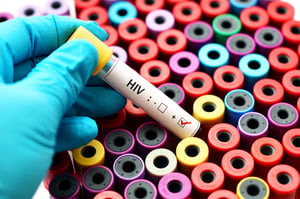 Human immunodeficiency virus (HIV) is a virus that targets and attacks the immune system. It is transmitted sexually, through blood, needles, or from mother to infant. There is no cure for HIV, and those who contract it have it for life. Without treatment, HIV can progress to AIDS and, eventually, be fatal. However, with proper diagnosis and care, a person with HIV can live a long, happy, and healthy life.
Human immunodeficiency virus (HIV) is a virus that targets and attacks the immune system. It is transmitted sexually, through blood, needles, or from mother to infant. There is no cure for HIV, and those who contract it have it for life. Without treatment, HIV can progress to AIDS and, eventually, be fatal. However, with proper diagnosis and care, a person with HIV can live a long, happy, and healthy life.
What happens in the first stage of HIV?
Once you’ve been infected with HIV, you could show symptoms as early as two to six weeks. Your body’s immune system will try to fight back against the virus. This stage is called acute retroviral syndrome, or primary HIV infection. Symptoms during this stage are similar to other viral infections. Visit FASTLane for an HIV test if you may have been in contact with someone who has HIV or have these symptoms:
- Fever
- Sore throat
- Headache
- Fatigue
- Muscle aches
- Maculopapular rash
- Swollen glands
- Chills
- Ulcers in the mouth, esophagus, vagina, or anus
How can I identify stage 2 of HIV?
In stage 2 of HIV is called the clinical latency stage. The virus is still active in your body during this time, but you may show little to no symptoms. At this stage, your immune system has lost its battle against HIV, and the virus will work to kill CD4 cells, the cells that coordinate with your immune system to trigger a response to infection. People who treat their HIV with antiretroviral therapy (ART) can remain in this stage for several years. The virus can still be passed to others during this stage, but the risk is lower with ART treatment.
Is stage 3 of HIV considered AIDS?
Once your CD4 cells drop below 200, the HIV has progressed to stage 3, also known as acquired immune deficiency syndrome (AIDS). During this phase, those who go untreated usually live approximately three years unless they become infected with another illness. During this time, you may become ill from opportunistic infections. These are infections that happen more often due to a weakened immune system. You may experience:
- Recurring fever
- Sores on the genitals or anus
- Sever chills at night
- Severe weight loss
- Shortness of breath
- Severe diarrhea that is long-lasting
- Purple spots on your skin
- Consistent breathing problems
- Regular coughing
- Memory loss
- Pneumonia
- Purple spots on your skin
- Unexplained bruising
- Sweats
We understand that testing for HIV can be a frightening decision to make, but the best way to take care of yourself now and in the future is to find out early and seek treatment. Our experts at FASTLane are available to help with your testing and everything that comes after. If you need an HIV test, contact us today to request an appointment with FASTLane.




